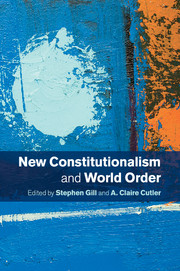Book contents
- Frontmatter
- Contents
- List of Figures
- List of Contributors
- Acknowledgements
- List of Acronyms
- 1 New constitutionalism and world order
- Part I Concepts
- Part II Genealogy, origins and world order
- Part III Multilevel governance and neo-liberalization
- Part IV Trade, investment and taxation
- Part V Social reproduction, welfare and ecology
- Part VI Globalization from below and prospects for a just new constitutionalism
- Glossary
- Appendix
- Bibliography
- Index
Appendix
Published online by Cambridge University Press: 05 February 2014
- Frontmatter
- Contents
- List of Figures
- List of Contributors
- Acknowledgements
- List of Acronyms
- 1 New constitutionalism and world order
- Part I Concepts
- Part II Genealogy, origins and world order
- Part III Multilevel governance and neo-liberalization
- Part IV Trade, investment and taxation
- Part V Social reproduction, welfare and ecology
- Part VI Globalization from below and prospects for a just new constitutionalism
- Glossary
- Appendix
- Bibliography
- Index
Summary
In preparation for this volume, the following questions were outlined and authors were requested to address some of them in their chapters:
Key questions and issues
How do you define new constitutionalism? How does it relate to the main conceptual and theoretical developments in your discipline or field?
What is old and what is new about constitutionalism/governance/world order in your area or domain of interest?
What are the origins and lineages of new constitutionalism?
What are the main transformations occurring in the global political economy and geopolitics, and what is their relationship to its principal governance arrangements?
How does the new constitutionalism relate to the direct and structural power of capital?
How does the ‘rule of law’ relate to global capitalism and the new constitutionalism?
What material and social forces either support or oppose new constitutionalism and why?
Identify, evaluate and critique those legal, institutional and normative aspects of new constitutionalism that can be associated with mechanisms to extend pro-market and self-regulatory reforms, e.g. through ‘best practices’, norms of ‘good governance’ or ‘global standards’ as well as the institutionalization and extension of private property rights.
How are social and political relations changing, e.g. through redefinitions of the public and private spheres, and how is this related to new constitutionalism?
- Type
- Chapter
- Information
- New Constitutionalism and World Order , pp. 326 - 327Publisher: Cambridge University PressPrint publication year: 2014

